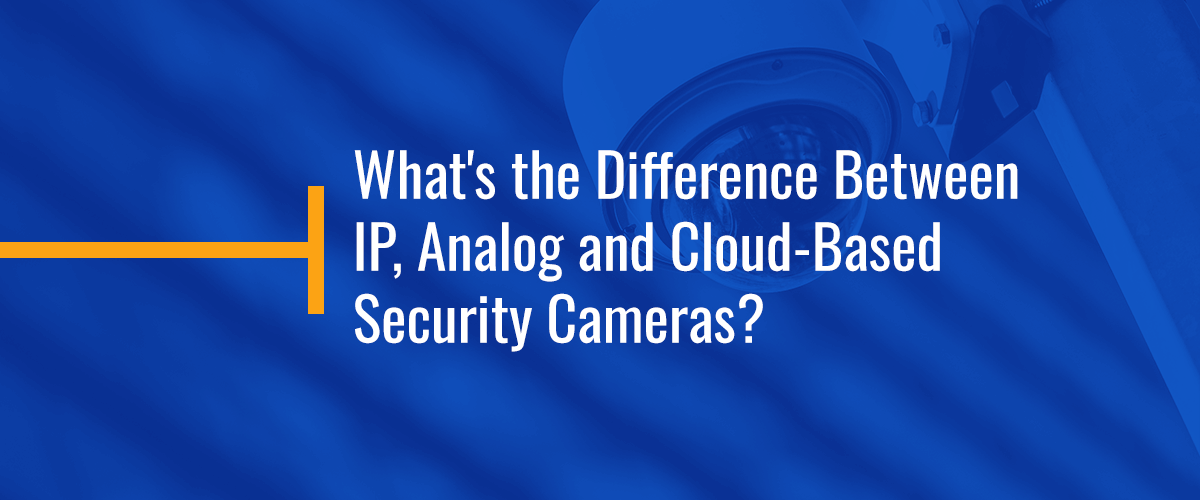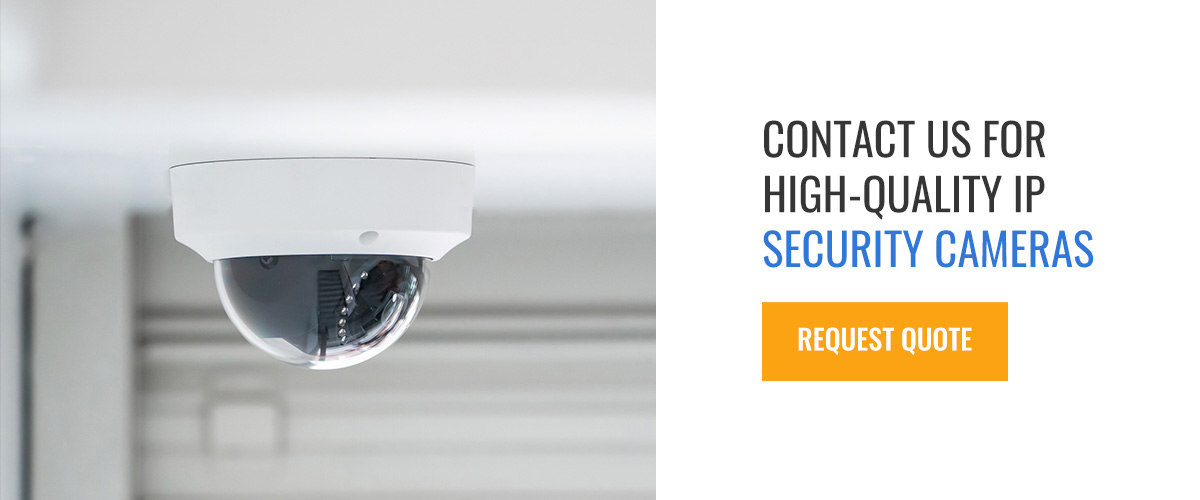If you’re looking into a home security camera for the first time, you might be surprised at how many options are available. You may not have realized there were so many different types of security cameras until you started looking. While all options can increase security around your home, you’ll need to consider the critical points of differentiation for IP vs. cloud-based vs. analog security cameras. Let’s break them down together.
Why Invest in a Security Camera System for Your Home?
You can gain many benefits regardless of the security camera system you choose. The most obvious is that alarm systems send suspicious activity alerts to deter theft. Besides a home alarm system, you might consider installing video surveillance cameras in and around your home to:
- Monitor your home remotely: If you want to monitor your home 24/7, many security systems come with remote monitoring. You can rest assured you’ll have a watchful eye on your security feeds.
- Save on your homeowners insurance: Some insurance companies will reduce your rate if you use a security camera. Since they deter crime, your property is at a lower risk. Contact your insurance provider for more information.
- Watch over your pets and family: Your security camera can do more than just watch for crime. You can pop into your live feed to see what your pets are up to or ensure your kids arrive home from school safely. You can also use it to check on your older relatives or to keep an eye on hired professionals working in your home, like babysitters, nannies, contractors, housekeepers and landscapers.
- Reduce crime in your entire neighborhood: The camera on your front porch can pick up on activity across the street, especially if you have high image resolution. This device can make your whole neighborhood safer and increase your property’s value.
- Provide evidentiary data: Security cameras can capture footage of a crime, which the police department can use in their investigation.
What Is an Analog Security Camera?
Analog cameras use coaxial cabling to transfer video feed to a digital video recorder (DVR). Because of the way they convert the video data, they are recorded locally on your DVR.
Pros of Analog Security Cameras
Analog security cameras offer advantages such as:
- Resistance to outages: Because they run on coaxial cables without being network-based, they will not show a latency in video streaming or IP conflicts.
- Less expensive: Probably the main draw of analog cameras is the lower price tag. The cost savings are apparent as you add more cameras to your home.
Cons of Analog Security Cameras
Analog cameras also come with drawbacks, such as:
- Lower image quality: Even today’s HD analog cameras, which can offer 4 megapixels or 5 megapixels, do not compare to IP cameras for picture quality. Analog cameras also have a slightly lower frame rate, which means they cannot capture lots of motion. However, capturing a crystal-clear image or lots of activity is not always necessary.
- Need for professional installation: Analog cameras have a complicated setup unsuitable for many do-it-yourselfers.
- Access to a separate power source: Along with their complicated installation process, analog cameras require more cabling, with separate power and DVR cables.
- No advanced features: Analog security systems don’t support advanced features such as motion detection and remote monitoring. You can, however, buy extra equipment to gain remote access.
- Scalability difficulties: Adding more analog cameras requires extra cables, which becomes difficult due to the few DVR input ports available.
What Is an IP Security Camera?
IP security cameras use internet protocol (IP) networks and run over Cat 5e or Cat 6 network cabling. The video footage is stored and viewed on a network video recorder (NVR). Because they run over computer networks, they can connect in a network. Plus, if they feature power over Ethernet (PoE), they can run a signal and power the camera over the same cable. The technology is more sophisticated, which offers several advantages over analog security cameras.
Pros of IP Security Cameras
IP cameras use more modern technology, which offers many advantages, such as:
- Highest resolution: If you need a camera that can zoom in on faces and provide the clearest possible image, you’re best off with an IP camera. They have a clearer picture and more megapixels, which allows for digital zoom. This feature enables you to zoom in on details in the recorded footage, allowing you to read license plates and get a clearer image of anything on the recording.
- Advanced camera functionality: Depending on the model you choose, IP cameras offer a range of advanced features, such as motion detection, AI-powered intelligence monitoring and adaptation to low-light settings. These motion and low-light capabilities allow the camera to adapt to real-time events, following movement and adjusting the image as the sun rises and sets.
- Ability to record audio: IP cameras can record audio, offering more details when examining the recording after an incident occurs.
- Wired through network cabling: You need only a single cable to send data and power the camera. This simplicity makes for an easier and more cost-effective installation. It can also make the wiring easier to hide for a cleaner final look.
- Easy scaling: It’s easy to add more cameras to your security system because you require limited infrastructure changes. Some products may come with multiple cameras in the same unit, permitting you to cover a wider area while reducing wiring and hardware costs. Also, their wider fields of view and zoom features can eliminate the need to add more cameras to boost coverage.
- Remote access: You can view camera footage and manage settings remotely, giving you more control and added peace of mind.
- Data encryption: IP cameras can encrypt data before transmitting it through the internet to increase security.
- Easy integration with smart devices: IP security devices feature open standards, enabling them to integrate with your wider smart home solutions.
Cons of IP Security Cameras
While IP cameras are what we usually recommend to our clients, it’s crucial to acknowledge downsides, such as:
- Cost: The superior technology in IP cameras comes with a higher price tag, but the lower cabling and networking costs balance out this price. Generally, IP cameras have a higher lifetime value than analog cameras.
- Potential IP conflicts in programming: IP conflicts can occur when multiple devices on a network share an IP address. This can cause a camera to fail or the signal to drop out. These cameras require an expert to install the network properly to avoid conflicts.
- Need for professional installation: While IP cameras are significantly easier to install than analogs, they still need a professional to handle the installation.
What Are Cloud-Based Security Cameras?
Cloud-based security systems are the do-it-yourselfer’s security camera. You’re probably familiar with them through solutions such as Ring, Nest, Blink and Arlo. While you can install them yourself, you can also work with a professional to ensure a secure installation. A cloud-based security camera works via Wi-Fi and stores its footage in the cloud. The owner pays a monthly fee for cloud storage and can access the footage via an app on their phone while receiving alerts when the camera detects motion.
Pros of Cloud-Based Security Cameras
Cloud-based home security camera systems offer some unique benefits, such as:
- Easy to install: Cloud-based cameras are typically designed for a homeowner to install independently.
- Wireless: Because these cameras are wireless, you can install them anywhere on your property without wiring and move them around later if you choose.
- Cloud storage: Cloud storage means you don’t have to keep a separate video storage device somewhere at your house and can easily access your footage and recordings online via the cloud.
- Can record audio and video: Like IP cameras, cloud-based cameras can record audio and video. Some, like Ring, offer two-way audio so you can talk to someone at the door.
Cons of Cloud-Based Security Cameras
While cloud-based systems are great for easy, do-it-yourself security, their simplicity comes with some downsides, such as:
- Can be easily defeated: Because they run over Wi-Fi, they’re the easiest type of camera to hack into or disable.
- Reliant on a Wi-Fi connection: Even when protected from hacking, the camera is only as strong as your Wi-Fi signal.
- Requires a monthly fee: The convenience of cloud storage typically comes with a monthly fee, which can add up over time.
Contact Us for High-Quality IP Security Cameras
Silent Guardian offers the latest and greatest IP video security cameras, giving you high-definition footage and easy viewing and playback from anywhere. These options provide a continuous live image and record automatically when they detect motion, helping you save storage space while still getting a comprehensive view of your home.
The experts at Silent Guardian choose the best camera placement for every home. We’ll maximize your field of view, eliminate blind spots and choose the least obtrusive location for every camera. We’ll also match the camera to the mounting surface and ensure all wiring is neatly tucked away from view. Contact our team today to request a site assessment and estimate for your home security camera installation.

